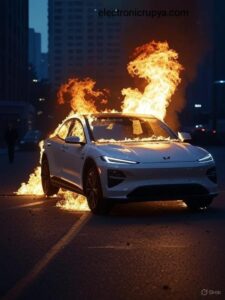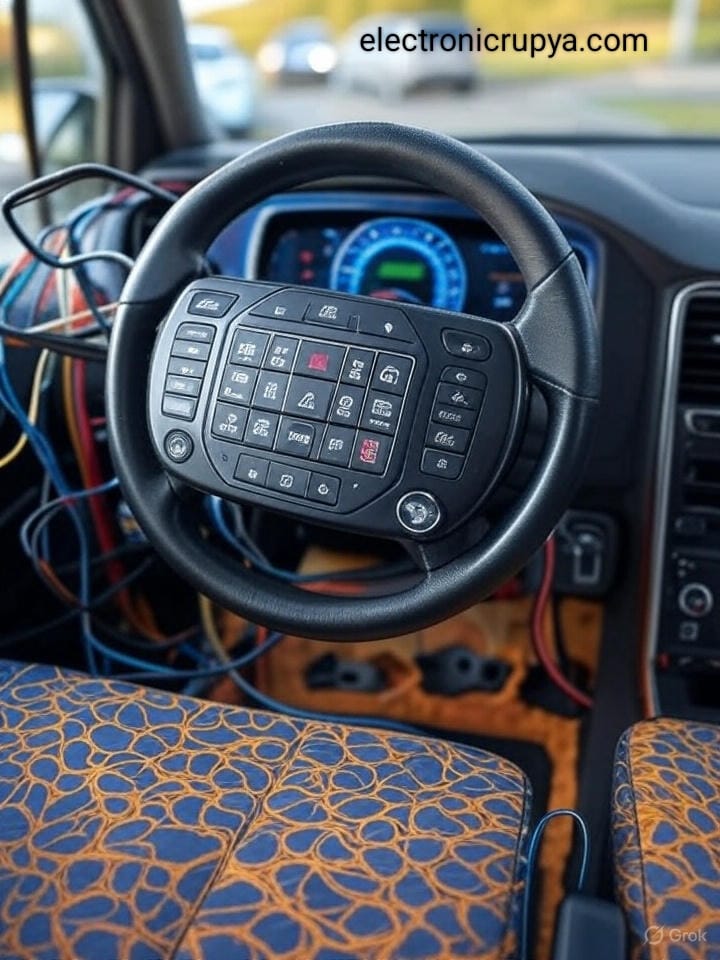Introduction
Electric Vehicles, or EVs, are becoming extremely popular in India and the world. With the trend of going green and fuel being pricier, many have now begun turning away from petrol and diesel vehicles. But with this growing demand for EVs, there have been some issues — mainly about EVs catching fire.
Although EV fires are fewer in occurrence than petrol or diesel car fires, they get more media coverage because they are new and unfamiliar. Understanding what causes the fires and how to prevent them is highly applicable to anyone who wishes to own or possess an electric vehicle.
In this article, I will outline the main causes of EV fire accidents in India, why the batteries become faulty in such accidents, and safety measures that can be implemented to avoid such unsafe incidents.
Why Do EVs Catch Fire ?

There are a number of generic reasons why EVs end up in fires. They are largely battery system-based because all electric vehicles have a battery system at their heart. The standard EV uses a lithium-ion battery, which packs a huge amount of energy in a very small space. Even though these batteries are absolutely fine under normal use, some complications can lead to overheating or fires
It could be because of:
Overcharging.
Exposure to high temperature.
Internal short circuits in the battery.
Faulty battery cells or malfunction.
2. Poor Manufacturing And Faulty Components
Faulty battery components, loose plug-in connectors, or improper sealing of the battery casing caused some of the early fire accidents in India. In some cases, the battery management system (BMS) was not able to control charging or fault detection.
Purchasing EVs from unheard-of brands or manufacturers that do not adhere to the appropriate safety standards heightens the risk of such accidents.
3. External Damage And Water Ingress
If the vehicle is involved in an accident, the battery becomes physically damaged. Damages to the cover could allow water or air within the battery box, and this can cause a fire. Waterlogging caused by monsoons in some areas in India has been an issue with poorly sealed batteries.
4. Improper Charging Practices
Low-cost or untested chargers, charging at unsafe locations, or leaving the vehicle connected for long periods is also unsafe for generating fires. It is even more perilous in villages or homes with faulty wiring and grounding.
Real Incidents In India
There have been some EV fire accidents involving four-wheelers and two-wheelers in the past few years. There were instances in the year 2022 when some smaller brand electric scooters
caught fire while charging or even in use. These incidents prompted government investigations and recalls. Thankfully, most of the leading brands have made efforts to improve safety since then.
Safety Measures
1. AIS 156 Battery Safety Standard
The Ministry of Road Transport and Highways (MoRTH) has mandated all EV
manufacturers to implement the AIS 156 safety standard. This includes standards for:
Battery pack design and life.
Proper insulation.
Fire resistance.
BMS performance.
These tests ensure the battery will not catch fire readily, even when subjected to extreme conditions.
2. Better Battery Management Systems (BMS)
New EVs have advanced battery management systems that track real-time charge cycle, voltage, and temperature. Power is shut down or alarms in the event of an abnormal occurrence.
3.User Awareness and Charging Safety
Manufacturers now also provide special instructions for safe charging. They tell their users to:
1. Do not use faulty or untested chargers
Keep the EV in the shade or cool place while charging
2. Don’t overcharge the car
3. Install proper home charging equipment with circuit breakers.
Precautions
Although EV Fire do not occur frequently, it still makes sense to be cautious:
1. Buy only from reputable and recognized brands
2. Never charge the EV close to flammable substances
3. Do not ignore warning lights or overheating warnings
4. Keep the vehicle’s software updated
Don’t ride in the deep waters during the rainy season
Just like petrol vehicles need maintenance, EVs also need maintenance — especially the battery.
Conclusion
Electric cars are an important part of our future, but, as with all technologies, they are not absolutely safe. EV Fire accidents can be terrifying, but they can be prevented if the EV is properly designed and driven cautiously. All the big companies have already made huge progress in battery safety, fire resistance, and charging stability.
As more Indians go electric — in villages and towns as well — it’s important to learn how to install and charge them safely. So when you or a family member are thinking of buying an EV, don’t compare only the speed and the range. Always ask about the quality of the battery, fire protection technologies, and safety certifications. Because safety isn’t a feature — it’s a
responsibility.







3 thoughts on “EV Fire Incidents in India-2025: Causes and Safety Measures .”